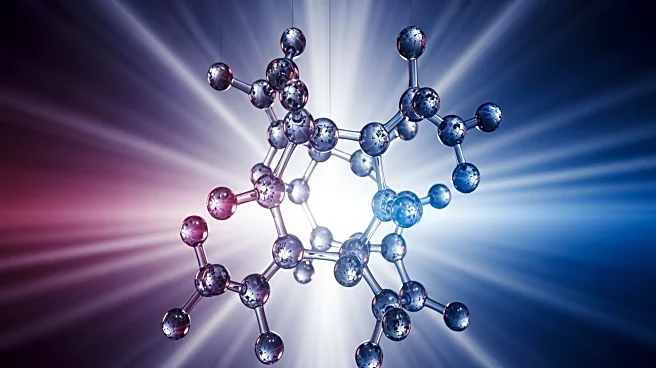What's Happening?
FutureBio, a company based in Berkeley, is pioneering a new type of plastic that aims to address the global issue of plastic pollution. Co-founder Zilong Wang describes this innovation as a durable, bio-renewable
plastic that is easier to recycle compared to traditional petroleum-based plastics. The company focuses on chemical recycling, a process that breaks down plastics into their original molecular components, allowing for high recycling rates. This development comes amid increasing scrutiny of traditional plastics, which are predominantly petroleum-based and contribute significantly to environmental pollution. FutureBio's initiative is part of a broader movement to replace conventional plastics with more sustainable alternatives, as evidenced by California's legal actions against major corporations like ExxonMobil for misleading recycling claims.
Why It's Important?
The development of a new sustainable plastic by FutureBio is significant as it addresses the pressing issue of plastic pollution, which has far-reaching environmental impacts. Traditional plastics, which are largely non-biodegradable, contribute to pollution in oceans and landfills, affecting wildlife and ecosystems. By offering a recyclable and durable alternative, FutureBio's innovation could reduce reliance on petroleum-based plastics and promote a circular economy. This shift is crucial as states like California push for stricter environmental regulations and as public awareness of plastic pollution grows. The success of such sustainable materials could also influence industry standards and encourage further investment in green technologies, despite current political and economic challenges.
What's Next?
FutureBio plans to bring its new plastic to market within the next two to three years. The company is currently working on developing specific products, such as durable plastics for furniture and tools, rather than single-use items. As the company moves forward, it will need to navigate the challenges of scaling production and ensuring profitability in a changing regulatory landscape. The broader adoption of such sustainable materials will depend on building investor confidence and aligning with state-level environmental goals. FutureBio's progress could inspire similar innovations and contribute to a larger shift towards sustainable materials in various industries.
Beyond the Headlines
The development of sustainable plastics by companies like FutureBio highlights the ethical and environmental responsibilities of the manufacturing sector. As awareness of plastic pollution increases, there is a growing demand for transparency and accountability in how materials are sourced and disposed of. This innovation also raises questions about the role of government policy in supporting or hindering green technologies. The success of FutureBio's initiative could set a precedent for how businesses and governments collaborate to address environmental challenges, potentially leading to more comprehensive policies that support sustainable development.











